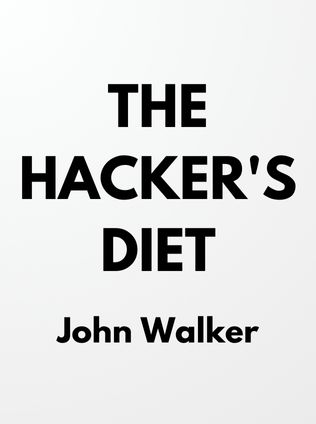
The Hacker's Diet
How to Lose Weight and Hair Through Stress and Poor Nutrition
By John Walker
Published 01/1991
About the Author
John Walker, a name widely recognized in the world of software engineering, is the co-founder of Autodesk, the company that created AutoCAD—a revolutionary piece of software that transformed the fields of architecture, engineering, and design. However, Walker's contributions extend beyond the realm of technology. As an individual deeply fascinated by systems and efficiency, he turned his attention to one of the most challenging and universal problems—weight management. With "The Hacker's Diet," Walker applied his analytical prowess to the science of dieting, creating a system that anyone, regardless of their background, could follow. His approach is rooted in data-driven insights and a pragmatic philosophy, offering a refreshingly systematic way to tackle a problem that often feels overwhelming.
Main Idea
At the core of "The Hacker's Diet" is a simple yet profound truth: weight loss is fundamentally a matter of consuming fewer calories than you burn. This idea, while seemingly obvious, is often overshadowed by the myriad of diets, trends, and quick fixes that promise miraculous results. Walker strips away the noise and focuses on the basic mechanics of weight loss, offering a methodical approach that anyone can understand and implement. His philosophy is grounded in the belief that with the right tools and mindset, weight loss is achievable for everyone. The key, he argues, is to approach dieting not as a one-time effort but as a system that can be maintained over the long term.
Table of Contents
- Introduction to Weight Loss
- The Eat Watch: Understanding Your Body's Signals
- Tracking Your Weight: A Data-Driven Approach
- Meal Planning: The Key to Success
- The Weight Loss Journey: What to Expect
- Perfect Weight Forever: Maintaining Your Progress
The Eat Watch: Understanding Your Body's Signals
One of the most intriguing concepts in "The Hacker's Diet" is the idea of the "Eat Watch." Walker uses this metaphor to describe the internal mechanism that regulates hunger and satiety. In an ideal world, our Eat Watch would function perfectly, signaling us to eat only when necessary and to stop once we've consumed enough calories. However, in reality, many people have a broken Eat Watch. This malfunctioning mechanism leads to overeating, as the signals that tell us when to stop eating are either too weak or ignored altogether.
Walker compares this to having bad vision; just as one would need glasses to correct poor eyesight, those with a broken Eat Watch need to develop tools and habits to compensate for their body's natural deficiencies. The solution he proposes is to build an artificial Eat Watch by diligently tracking your calorie intake and monitoring your weight. This external control system acts as a replacement for the faulty internal mechanism, allowing you to regulate your eating habits more effectively.
Walker emphasizes that this process is not about deprivation or extreme dieting but about regaining control over your body's signals. By understanding how many calories your body needs and how much you're consuming, you can create a balance that leads to sustainable weight loss.
"People who have been skinny their entire lives have perfectly tuned Eat Watches. When they eat over their caloric requirement for the meal, they simply stop eating." - John Walker
This concept of the Eat Watch is crucial because it shifts the focus from what you eat to how much you eat. Walker argues that it's possible to lose weight on any diet, whether it's high in fat, carbs, or protein, as long as the total caloric intake is lower than what your body burns. This perspective demystifies weight loss and makes it more accessible, removing the confusion and stress that often accompany dieting.
Sign up for FREE and get access to 1,400+ books summaries.
You May Also Like
The Subtle Art of Not Giving a F*ck
A Counterintuitive Approach to Living a Good Life
By Mark MansonRich Dad Poor Dad
What the Rich Teach Their Kids About Money - That the Poor and Middle Class Do Not!
By Robert T. KiyosakiHow To Win Friends and Influence People
The All-Time Classic Manual Of People Skills
By Dale CarnegieFreakonomics
A Rogue Economist Explores the Hidden Side of Everything
By Steven D. Levitt and Stephen J. Dubner



















